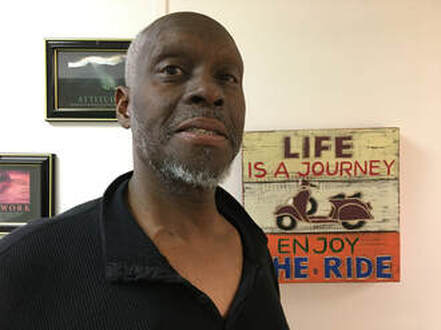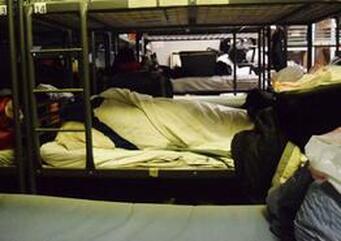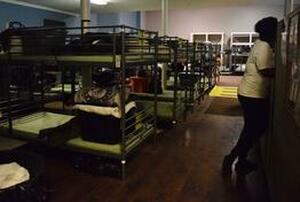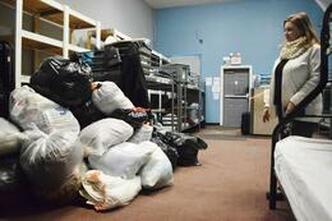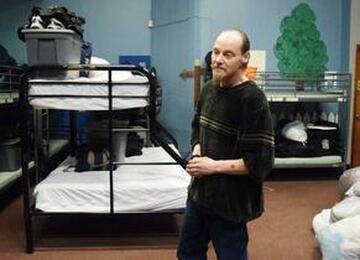St Irenaeus Church Group Serves at HOPE Shelter

Last week, I dropped off some donations at the HOPE Shelter. Two women sat on the front steps looking down at their feet, with looks of despair and fatigue on their faces. One small, spry gentleman in the corner smiled in the afternoon sun and good-naturedly offered to ring the doorbell for me. When the door was opened, I presented the donations of shoes and duffle bags, but was asked to walk around to the back door. The helpful gentleman’s eyes lit up and asked if he might please have the blue duffle I was holding. “Sure!” I said, and happily handed the bag to its new owner.
The looks on the faces of those women stayed with me all the way home to my cozy suburban house with its fridge full of food, and bed full of pillows. I ached to ease their pain. I prayed for all the guests that night, especially those who had lost hope, or faced hurdles that seemed insurmountable.
Once or twice a summer, our HOPE Shelter planning team plans a cookout for shelter guests. We don’t publicize it in the bulletin… our parish’s Evangelical Charity budget and HOPE team donations cover the menu and supplies; and friends, family, and a few parishioners come out of the woodwork to support the efforts simply by word of mouth. Tonight was such a cookout—BBQ baby back ribs, cheesy potatoes, Asian cabbage slaw, deviled eggs, rolls, fruit salad, and dessert, with a Tiger theme. But it rained, so the grand outdoor party we planned was rescheduled to the basement, back to eating in shifts.
I usually don’t go on site anymore, as my team always has everything covered so well. But I miss it—the energy of our team, the interaction with the guests, being able to serve and offer kindness…. Tonight, I was wrapped up in one task July 21, 2024 after another at work—trying to cram the most into my shortened summer hours—and all of a sudden it was 6 pm. I knew dinner would probably be over by the time I arrived at HOPE, and debated the purpose in showing up at all. But I wanted to be there, even for a moment and feel the fullness of grace that always covers those nights, and give myself a visual reminder of why I do the work I do. And those women on the porch steps were still on my heart….
Arriving late, I almost didn’t make it into the building. No one answered the back door, so I went around to the front. About eight people were huddling on and near the porch trying to get shelter from the rain. A young white girl (did she just age out of foster care?) sat politely next to a thin black woman who looked like she could be someone’s grandma. The gentlemen with perfect smiles and toothless grins, shaggy beards and polished speech, rounded out the picture that proves homelessness knows no boundaries.
I knocked. No one answered. One gentleman asked the young girl sitting under the doorbell to ring it for me. She obliged. More waiting, and knocking, and I was about to turn to go home, realizing I really was too late. Then the door opened a crack. When I said the magic words, “I’m with St. Irenaeus,” I was welcomed in, and the door shut behind me. Why were these poor souls still outside? Did they miss the check in window? Do they have anxiety being so close to others inside a small space? Is the dripping rain more comfortable than a room full of snoring? Do they have a personal conflict with someone on the inside? I will never know….
I was right—dinner was over, the last couple of guests were polishing off dessert, dishes were nearly done, and our volunteers were taking a moment to sample the feast they put on for the rest of the shelter guests and staff. They packaged up extra plates of food for staff and guests staying in a hotel. Then I asked about feeding the people outside. Our volunteers did not even know they were there. It was doubtful we could offer them food, as the past always dictated we were only allowed to feed those who were inside. But… there was a new director, so Colleen thought it couldn’t hurt to ask! I saw compassion on her face when the new woman in charge told us we could offer them plates of food. I asked our surprised friends on the porch if they were hungry and would like us to bring them a plate of dinner. Our team scrambled to fill more plates. We always have plenty to go around! Seven guests were hungry, two of them did not eat pork. We had one veggie burger left, and found a sandwich in the fridge for the other. Everyone got all the sides, and we brought out lemonade, extra wet naps, and our baskets bearing gifts (from Chapstick to baseball caps).
Watching our parishioners in action was such a gift to me… running to refill lemonade, making sure everyone had enough of everything they wanted, ‘seeing’ the guests and granting them dignity by talking to them like family (but perhaps with even more respect!). The HOPE shelter guests were truly honored guests served by our parishioners with servant’s hearts. I am tearing up as I remember the energy of love in that kitchen. The joy of our servants—it was almost tangible. Christ was so present to me tonight. I am glad I went for myself, selfish though it was… and God worked it for the good as only He could, because He fed another seven on the porch. Thank you, HOPE Team! ~ Cindy Monaghan
The looks on the faces of those women stayed with me all the way home to my cozy suburban house with its fridge full of food, and bed full of pillows. I ached to ease their pain. I prayed for all the guests that night, especially those who had lost hope, or faced hurdles that seemed insurmountable.
Once or twice a summer, our HOPE Shelter planning team plans a cookout for shelter guests. We don’t publicize it in the bulletin… our parish’s Evangelical Charity budget and HOPE team donations cover the menu and supplies; and friends, family, and a few parishioners come out of the woodwork to support the efforts simply by word of mouth. Tonight was such a cookout—BBQ baby back ribs, cheesy potatoes, Asian cabbage slaw, deviled eggs, rolls, fruit salad, and dessert, with a Tiger theme. But it rained, so the grand outdoor party we planned was rescheduled to the basement, back to eating in shifts.
I usually don’t go on site anymore, as my team always has everything covered so well. But I miss it—the energy of our team, the interaction with the guests, being able to serve and offer kindness…. Tonight, I was wrapped up in one task July 21, 2024 after another at work—trying to cram the most into my shortened summer hours—and all of a sudden it was 6 pm. I knew dinner would probably be over by the time I arrived at HOPE, and debated the purpose in showing up at all. But I wanted to be there, even for a moment and feel the fullness of grace that always covers those nights, and give myself a visual reminder of why I do the work I do. And those women on the porch steps were still on my heart….
Arriving late, I almost didn’t make it into the building. No one answered the back door, so I went around to the front. About eight people were huddling on and near the porch trying to get shelter from the rain. A young white girl (did she just age out of foster care?) sat politely next to a thin black woman who looked like she could be someone’s grandma. The gentlemen with perfect smiles and toothless grins, shaggy beards and polished speech, rounded out the picture that proves homelessness knows no boundaries.
I knocked. No one answered. One gentleman asked the young girl sitting under the doorbell to ring it for me. She obliged. More waiting, and knocking, and I was about to turn to go home, realizing I really was too late. Then the door opened a crack. When I said the magic words, “I’m with St. Irenaeus,” I was welcomed in, and the door shut behind me. Why were these poor souls still outside? Did they miss the check in window? Do they have anxiety being so close to others inside a small space? Is the dripping rain more comfortable than a room full of snoring? Do they have a personal conflict with someone on the inside? I will never know….
I was right—dinner was over, the last couple of guests were polishing off dessert, dishes were nearly done, and our volunteers were taking a moment to sample the feast they put on for the rest of the shelter guests and staff. They packaged up extra plates of food for staff and guests staying in a hotel. Then I asked about feeding the people outside. Our volunteers did not even know they were there. It was doubtful we could offer them food, as the past always dictated we were only allowed to feed those who were inside. But… there was a new director, so Colleen thought it couldn’t hurt to ask! I saw compassion on her face when the new woman in charge told us we could offer them plates of food. I asked our surprised friends on the porch if they were hungry and would like us to bring them a plate of dinner. Our team scrambled to fill more plates. We always have plenty to go around! Seven guests were hungry, two of them did not eat pork. We had one veggie burger left, and found a sandwich in the fridge for the other. Everyone got all the sides, and we brought out lemonade, extra wet naps, and our baskets bearing gifts (from Chapstick to baseball caps).
Watching our parishioners in action was such a gift to me… running to refill lemonade, making sure everyone had enough of everything they wanted, ‘seeing’ the guests and granting them dignity by talking to them like family (but perhaps with even more respect!). The HOPE shelter guests were truly honored guests served by our parishioners with servant’s hearts. I am tearing up as I remember the energy of love in that kitchen. The joy of our servants—it was almost tangible. Christ was so present to me tonight. I am glad I went for myself, selfish though it was… and God worked it for the good as only He could, because He fed another seven on the porch. Thank you, HOPE Team! ~ Cindy Monaghan
"God Knows Best"

Our session started with a Bible verse that Martin quoted, Job 11:18; “And thou shalt be secure, because there is hope. Yea, thou shalt dig about thee, and thou shalt take thy rest in safety.” This set the tone for our conversation.
Martin is a 59 year old gentleman with a lengthy history of different work experiences from a Real Estate agent to a movie production assistant in California to an I.T. manager. He experienced a life of wealth until a downturn in his employment. Martin knew it was a path that God would help him navigate.
Eight months at Hope Shelters allowed Martin to reflect on his growth. A time to get his affairs back in order like his I.D., health, and housing. As a man of faith, it was important for him to find a church to join. He found his home at All Saints Episcopal Church in Pontiac. His housing will be within walking distance of his parish. He showed me a picture of his new place with such pride.
As we departed Martin recited a poem that he wrote. He stood up from his chair and gathered his thoughts. When finished he looked at me and said, “ Perseverance has always been my mantra and God has always been my guide.” Good luck Martin!
Martin is a 59 year old gentleman with a lengthy history of different work experiences from a Real Estate agent to a movie production assistant in California to an I.T. manager. He experienced a life of wealth until a downturn in his employment. Martin knew it was a path that God would help him navigate.
Eight months at Hope Shelters allowed Martin to reflect on his growth. A time to get his affairs back in order like his I.D., health, and housing. As a man of faith, it was important for him to find a church to join. He found his home at All Saints Episcopal Church in Pontiac. His housing will be within walking distance of his parish. He showed me a picture of his new place with such pride.
As we departed Martin recited a poem that he wrote. He stood up from his chair and gathered his thoughts. When finished he looked at me and said, “ Perseverance has always been my mantra and God has always been my guide.” Good luck Martin!
"An Eye Opening Story"

Recently, Nicole, a volunteer at HOPE and an intern from Baker College, had a very eye-opening experience. She explained, she met and had a conversation with a HOPE guest named Robert. He didn’t disclose his age to her but if she had to guess she would say he’s in his early 50’s maybe 51 or 52. She asked him how he ended up at the shelter. His response was alcohol. Robert said, “I have been in and out of jail since I was 22 years old.”
After talking about how he was in and out of jail for a total of fourteen years, he shared that he always had a problem with authoritative figures which caused a lot of his problems throughout his life. His last time in jail he realized that all people with authority are not out to hurt him. He expressed that “Being in jail for 7 months really opened my eyes.” He continued, “I struggled with alcohol and drugs for years and dealing with the wrong people.”
While in jail in Flint, he realized he had to change his life. When Nicole asked if he ever had a support system in his life, he said “My mother until she died of an overdose.” Robert still has a brother and four kids that he has not spoken with in over a year.
The conversation led Nicole to ask him about his stay at Hope Shelters. He replied that he has been here for three weeks, and Hope has really helped him. He shared that he has been clean for these last three weeks. Robert said, “Hope is one of the best shelters I’ve been to. It’s more structured than other shelters and the staff is helpful.”
After reflecting on her conversation with Robert, Nicole stated “Overall, this conversation made me realize that things happen. We all have a story to tell, and things could always be worse. I’ve been through a lot in my own personal life, so it felt good to spend the day here and hear the stories of the HOPE guests.”
After talking about how he was in and out of jail for a total of fourteen years, he shared that he always had a problem with authoritative figures which caused a lot of his problems throughout his life. His last time in jail he realized that all people with authority are not out to hurt him. He expressed that “Being in jail for 7 months really opened my eyes.” He continued, “I struggled with alcohol and drugs for years and dealing with the wrong people.”
While in jail in Flint, he realized he had to change his life. When Nicole asked if he ever had a support system in his life, he said “My mother until she died of an overdose.” Robert still has a brother and four kids that he has not spoken with in over a year.
The conversation led Nicole to ask him about his stay at Hope Shelters. He replied that he has been here for three weeks, and Hope has really helped him. He shared that he has been clean for these last three weeks. Robert said, “Hope is one of the best shelters I’ve been to. It’s more structured than other shelters and the staff is helpful.”
After reflecting on her conversation with Robert, Nicole stated “Overall, this conversation made me realize that things happen. We all have a story to tell, and things could always be worse. I’ve been through a lot in my own personal life, so it felt good to spend the day here and hear the stories of the HOPE guests.”
“Hope is one of the best shelters I’ve been to."
"Finding My Way"

Richard’s journey started at Genesee County Hospital in Flint, MI and transitioned, by referral, to HOPE’s Recuperative Care Center (HOPE RCC) in Pontiac. Flint’s system did not support the needs he required. Richard found himself struggling to maintain his health and hold down a job. He was in and out of the hospital for dialysis treatment. Richard was unable to manage his health and understand the consequences for inadequate follow-through. His “low” was finding himself homeless and not having resources in Flint to help navigate the healthcare system.
His last visit to the hospital was the turning point when he was referred to HOPE RCC. Upon arriving at HOPE RCC, where “discharged to home” individuals experiencing homelessness can go for care, he knew he had found his safe place. HOPE RCC provides a vital service for those who would otherwise end up back on the streets without resources for their post hospitalization care.
There he found compassion, hope, discipline, and a true understanding of his immediate health needs. He was overwhelmed with all the resources he was eligible to receive and learned that SSI and Disability provided him with secure rides to doctor appointments, and most importantly, his dialysis treatments, which requires him to go 3 days a week for four hours. A case manager was assigned to guide him and keep track of his progress.
His goal, and hope, was to secure housing and that goal was met. Feeling valued and equipped to face this next phase in his apartment, Richard is confident and happy to be on his own, looking forward to meeting new people who will build him up and make him feel his new path will be bright.
Richard wants to give back to Hope by volunteering at HOPE RCC. His passion is to help and guide others by being a peer advocate, speaking not only from experience, but from the heart. This speaks volumes about this young man who found his life at a turning point and came out the other side with HOPE and grace.
His last visit to the hospital was the turning point when he was referred to HOPE RCC. Upon arriving at HOPE RCC, where “discharged to home” individuals experiencing homelessness can go for care, he knew he had found his safe place. HOPE RCC provides a vital service for those who would otherwise end up back on the streets without resources for their post hospitalization care.
There he found compassion, hope, discipline, and a true understanding of his immediate health needs. He was overwhelmed with all the resources he was eligible to receive and learned that SSI and Disability provided him with secure rides to doctor appointments, and most importantly, his dialysis treatments, which requires him to go 3 days a week for four hours. A case manager was assigned to guide him and keep track of his progress.
His goal, and hope, was to secure housing and that goal was met. Feeling valued and equipped to face this next phase in his apartment, Richard is confident and happy to be on his own, looking forward to meeting new people who will build him up and make him feel his new path will be bright.
Richard wants to give back to Hope by volunteering at HOPE RCC. His passion is to help and guide others by being a peer advocate, speaking not only from experience, but from the heart. This speaks volumes about this young man who found his life at a turning point and came out the other side with HOPE and grace.
He knew he had found his safe place.
"Me Again"

Shane had been living in a mobile home when he lost his job due to COVID. He tried to navigate the unemployment system but gave up without any success. He fell behind on his rent and lost his car. As his economic crisis snowballed, he began to isolate himself. He felt completely overwhelmed by life. He received an eviction notice but did not know what to do or who to turn to for help.
A bailiff came to his house to evict him. Shane says he was in a bad frame of mind. He was hopeless, depressed, and drinking uncontrollably. Shane thought, "This is going to be my life now." He began to associate with a group of people he refers to as the Misery Loves Company Crowd. From the spring of 2021, he was in and out of HOPE's adult shelter. Then in the fall of 2021, Shane looked at the Misery Loves Company Crowd and said to himself that these people have been doing this for years. He didn't want that for himself. Shane became hungry to survive and to reconnect with the son with whom he had lost contact. Shane said, "I wanted to get back to who I was."
He went to the hospital to get back on his medications. He was in a lot of pain and the hospital found that his gallbladder was about to rupture. He had surgery and was released from the hospital. He was discharged from the hospital to HOPE's Recuperative Care Shelter. While at Recup, Shane obtained his state identification, social security card, and food stamps. He found housing and the furnishings are being supplied by Humble Design. Shane says triumphantly, "I have gone from being beaten up and defeated to who I am, me again. HOPE is proud to have contributed to Shane's rebirth.
A bailiff came to his house to evict him. Shane says he was in a bad frame of mind. He was hopeless, depressed, and drinking uncontrollably. Shane thought, "This is going to be my life now." He began to associate with a group of people he refers to as the Misery Loves Company Crowd. From the spring of 2021, he was in and out of HOPE's adult shelter. Then in the fall of 2021, Shane looked at the Misery Loves Company Crowd and said to himself that these people have been doing this for years. He didn't want that for himself. Shane became hungry to survive and to reconnect with the son with whom he had lost contact. Shane said, "I wanted to get back to who I was."
He went to the hospital to get back on his medications. He was in a lot of pain and the hospital found that his gallbladder was about to rupture. He had surgery and was released from the hospital. He was discharged from the hospital to HOPE's Recuperative Care Shelter. While at Recup, Shane obtained his state identification, social security card, and food stamps. He found housing and the furnishings are being supplied by Humble Design. Shane says triumphantly, "I have gone from being beaten up and defeated to who I am, me again. HOPE is proud to have contributed to Shane's rebirth.
"I have gone from being beaten up and defeated to who I am - me again."
New-style homeless sheltering aims to save lives and dollars
Bill Laitner
|
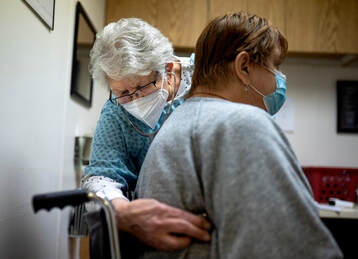
It was after several winters of sheltering the homeless men at night and learning they were increasingly stumbling around in the snow by day — sometimes sleeping out in it — that the plight of Jim and Gary came dramatically to Elizabeth Kelly’s attention.
As their conditions deteriorated, Jim and Gary had been in and out of Pontiac’s main hospital, at that time called POH Medical Center. They first had their frozen toes thawed, next amputated one by one, followed by amputations of entire feet, and then ultimately came their pitiful deaths.
Kelly, founder of a homeless shelter called HOPE Warming Center on Pontiac’s north side, had tried to help Jim and Gary, but she couldn’t. Suddenly, she realized why.
“One of them cost the hospital $1.5 million in care. The other one, $1.2 million. And so I sat down with the hospital’s CEO and I said, ‘There’s a better way. Let’s work together on this. I think I have the answer.’
“And now, the hospital is our partner,” Kelly said. She spoke as she gave visitors a recent tour of her answer to the revolving door of hospital admissions for the homeless, a pattern that has cost hospitals and society far too much without truly helping homeless patients, and sometimes costing them their lives, she said.
As their conditions deteriorated, Jim and Gary had been in and out of Pontiac’s main hospital, at that time called POH Medical Center. They first had their frozen toes thawed, next amputated one by one, followed by amputations of entire feet, and then ultimately came their pitiful deaths.
Kelly, founder of a homeless shelter called HOPE Warming Center on Pontiac’s north side, had tried to help Jim and Gary, but she couldn’t. Suddenly, she realized why.
“One of them cost the hospital $1.5 million in care. The other one, $1.2 million. And so I sat down with the hospital’s CEO and I said, ‘There’s a better way. Let’s work together on this. I think I have the answer.’
“And now, the hospital is our partner,” Kelly said. She spoke as she gave visitors a recent tour of her answer to the revolving door of hospital admissions for the homeless, a pattern that has cost hospitals and society far too much without truly helping homeless patients, and sometimes costing them their lives, she said.

Kelly’s answer is the HOPE Recuperative Center, which she and her funding partners opened in Pontiac in 2015. The specialized shelter aims to prevent the waste of health care dollars and life that Jim and Gary came to personify. Inside a former dental office, rooms where a dentist once drilled teeth now house 15 homeless men and women, all with chronic medical conditions that are being treated by daily visits of nurses under the long-term supervision of a care manager.
The HOPE Recuperative Center is a more expensive refuge than standard homeless shelters. Still, it’s less costly than sending people through a revolving door at the hospital emergency room. It’s also more compassionate and just plain sensible to get people well while finding them housing, as opposed to discharging them from hospital beds to the streets, Kelly said.
The HOPE Recuperative Center is a more expensive refuge than standard homeless shelters. Still, it’s less costly than sending people through a revolving door at the hospital emergency room. It’s also more compassionate and just plain sensible to get people well while finding them housing, as opposed to discharging them from hospital beds to the streets, Kelly said.
Cloning the concept
Michigan social agencies have discovered this best-practices approach to helping the homeless, called by two names: recuperative care and medical respite. After Kelly established the HOPE Recuperative Center in Pontiac, agency managers from Flint and Washtenaw County visited before planning their versions, she said.
In 2017, the Salvation Army opened its Detroit Medical Respite center. Elsewhere in Detroit, the Neighborhood Services Organization is building a large state-of-the-art Healthy Housing Center on Mack Avenue near Gratiot, about two miles northeast of the city’s downtown. It’s a site that will not only house at-risk homeless persons, including those with serious medical risk but also will offer primary health care services to the surrounding community of low-income residents, NSO President and CEO Linda Little said.
In 2017, the Salvation Army opened its Detroit Medical Respite center. Elsewhere in Detroit, the Neighborhood Services Organization is building a large state-of-the-art Healthy Housing Center on Mack Avenue near Gratiot, about two miles northeast of the city’s downtown. It’s a site that will not only house at-risk homeless persons, including those with serious medical risk but also will offer primary health care services to the surrounding community of low-income residents, NSO President and CEO Linda Little said.
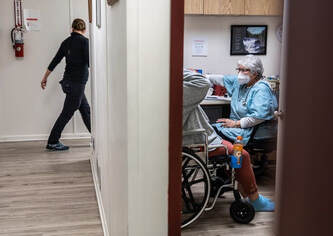
The Healthy Housing Center has funding from the city of Detroit, Rocket Community Fund, and other supporters, bringing to fruition a dream that NSO’s leaders nurtured for more than a decade, Little said. They’d long operated a conventional shelter in the city’s Cass Corridor, Little said.
“But we knew that model didn’t work. It was a place where people came just to spend the night, to shower, sit in chairs all night and then leave in the morning. But we weren’t providing services that truly fit the needs of this community,” she said.
A batch of academic studies, summarized in a comprehensive review of data published last year by the Nashville-based National Healthcare for the Homeless Council, found that recuperative shelters saved an average of $25,000 per patient getting outpatient treatment, and determined that hospitals treating inpatients saved $1.81 for each dollar they invested in helping to fund recuperative shelters. What the research also showed was that individual outcomes vastly improved, said Julia Dobbins, director of medical respite programs for the Homeless Council.
“What we’ve found is that it’s really important that programs treat not just pneumonia or the broken leg but the whole person,” including behavioral and addiction disorders, Dobbins said.
Unlike the rule at old-style shelters, these recuperative “guests” — as Kelly refers to them —aren’t kicked out during the day, only to return and form a line outdoors in the cold at 3 or 4 p.m. while awaiting readmission for the night. Instead, they stay for weeks or even months until they’re healthy, or at least until their conditions are stable. Then, they’re discharged to apartments for permanent housing, not sent out into the snow.
“But we knew that model didn’t work. It was a place where people came just to spend the night, to shower, sit in chairs all night and then leave in the morning. But we weren’t providing services that truly fit the needs of this community,” she said.
A batch of academic studies, summarized in a comprehensive review of data published last year by the Nashville-based National Healthcare for the Homeless Council, found that recuperative shelters saved an average of $25,000 per patient getting outpatient treatment, and determined that hospitals treating inpatients saved $1.81 for each dollar they invested in helping to fund recuperative shelters. What the research also showed was that individual outcomes vastly improved, said Julia Dobbins, director of medical respite programs for the Homeless Council.
“What we’ve found is that it’s really important that programs treat not just pneumonia or the broken leg but the whole person,” including behavioral and addiction disorders, Dobbins said.
Unlike the rule at old-style shelters, these recuperative “guests” — as Kelly refers to them —aren’t kicked out during the day, only to return and form a line outdoors in the cold at 3 or 4 p.m. while awaiting readmission for the night. Instead, they stay for weeks or even months until they’re healthy, or at least until their conditions are stable. Then, they’re discharged to apartments for permanent housing, not sent out into the snow.
A frozen body

“When all we had was a warming shelter, we saw the same people every winter. Then it was, ‘OK, have a safe summer. We’ll see you in December.’ That doesn’t happen anymore. We realized we had to stay open all year,” Kelly said, recalling the transition of her original shelter to a year-round haven, which is inside a former Presbyterian church. That shelter, too, she founded after the wintry death of a homeless person in Pontiac. A man’s body had been found frozen solid inside an abandoned house in 1998.
His death came soon after Michigan and states nationwide began a trend of closing state-funded mental hospitals and “mainstreaming” their wards into society, with the goal of having them treated at outpatient clinics. Many simply began wandering the streets. That trend, and the man’s death, motivated Kelly to leave her social work office job and dive headfirst into providing emergency shelter, she said. Since then, her approach and the entire sheltering ethos have evolved toward finding permanent housing for the homeless.
One "guest" trying to embody the first word in the shelter's name is Carolyn Meyers, who said she'd recently spent several weeks at a nursing home in Lake Orion, then was discharged when her Medicaid coverage ended.
Meyers had no home to go to, and she feels hopeful to have landed at the HOPE center in Pontiac, she said. The name for the HOPE shelter programs in Pontiac, not to be confused with the well-known job raining and food distribution program in Detroit called Focus: HOPE, is an acronym for a phrase that Kelly coined: "Helping Oakland's People Everyday."
His death came soon after Michigan and states nationwide began a trend of closing state-funded mental hospitals and “mainstreaming” their wards into society, with the goal of having them treated at outpatient clinics. Many simply began wandering the streets. That trend, and the man’s death, motivated Kelly to leave her social work office job and dive headfirst into providing emergency shelter, she said. Since then, her approach and the entire sheltering ethos have evolved toward finding permanent housing for the homeless.
One "guest" trying to embody the first word in the shelter's name is Carolyn Meyers, who said she'd recently spent several weeks at a nursing home in Lake Orion, then was discharged when her Medicaid coverage ended.
Meyers had no home to go to, and she feels hopeful to have landed at the HOPE center in Pontiac, she said. The name for the HOPE shelter programs in Pontiac, not to be confused with the well-known job raining and food distribution program in Detroit called Focus: HOPE, is an acronym for a phrase that Kelly coined: "Helping Oakland's People Everyday."
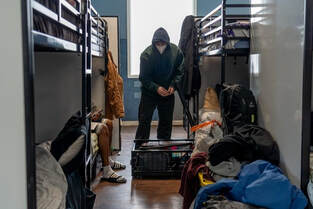
Having Meyers and other guests live at the recuperative shelter for extended stays makes a crucial difference in their trajectory. Experience shows that it springs them not only toward future health but also toward permanent housing and, in some cases, jobs or job training, Kelly said. Because the individuals are on-site day after day, case managers can provide focused assistance, helping them obtain identification documents, setting up appointments for mental health and substance abuse treatment, negotiating the application process to obtain disability incomes and find suitable homes, and sometimes finding them jobs.
Often, they find roles related to having been a homeless person, one who is now able to assist and advise others with added credibility "because they've been there," Kelly said.
Often, they find roles related to having been a homeless person, one who is now able to assist and advise others with added credibility "because they've been there," Kelly said.
Rents soaring nationwide
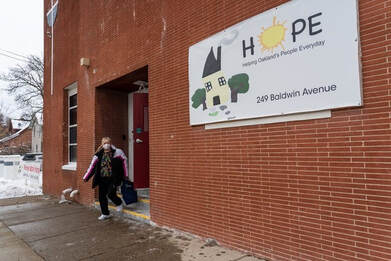
Once a homeless person is ready for an apartment, finding one that's affordable typically is a big hurdle, said Oakland County Commissioner and social worker Charlie Cavell, D-Ferndale. Housing is often the largest expense for low-income individuals, said Cavell, who serves with Kelly on committees seeking ways to provide more low-cost housing in Oakland, Michigan's most affluent large county.
"She has actually lobbied some of our commissioners. ... She sees the bigger picture to truly understand" the housing shortage, a nationwide problem that is beginning to affect middle-income Americans as well those on low incomes, Cavell said.
In Oakland County, more than 25% of households have what are deemed "excessive homeowner costs," something "really significant for renters," with more than 40% of renter households paying about a third or more of their income on rent — too much to sustain a normal lifestyle, Cavell said. Put another way, a person earning Michigan's minimum wage and trying to afford a modest one-bedroom apartment in Oakland County would need to work at least 65 hours a week, Cavell said.
Getting the HOPE Recuperative Center open and running smoothly has crowned Kelly's quarter-century of overseeing shelters in Pontiac. She retired from HOPE's operations in January, although she still visits often to hear out the concerns of guests and to mentor her successor, Brian Wright. She's also still active in advocacy, taking part in meetings and working to get pending bills passed in Lansing that would more widely fund the programs she innovated in Pontiac.
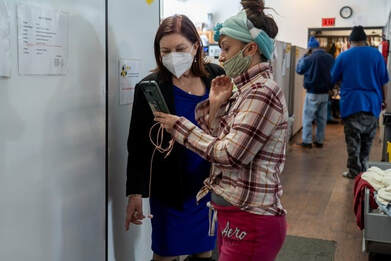
One of those who have served with Kelly on advocacy groups for more than a dozen years knows well about the passion she brings to the cause. Shane Bies, who works for Oakland County to manage Department of Housing and Urban Development funding, recalls the two sad and vivid cases — still referred to by Oakland County homeless and housing officials as "Jim and Gary" — that pushed Kelly to found Pontiac's recuperative shelter and make it a model for others.
To talk the hospital officials and other funders into opening their wallets, it took the proverbial village, Bies recalled. Former Oakland County Health Director George Miller "was instrumental in opening doors, our department prepared slides for the presentation, but then it really was Elizabeth who added the passion that was really persuasive."
Contact: [email protected]
To talk the hospital officials and other funders into opening their wallets, it took the proverbial village, Bies recalled. Former Oakland County Health Director George Miller "was instrumental in opening doors, our department prepared slides for the presentation, but then it really was Elizabeth who added the passion that was really persuasive."
Contact: [email protected]
Out of Control Health Issues
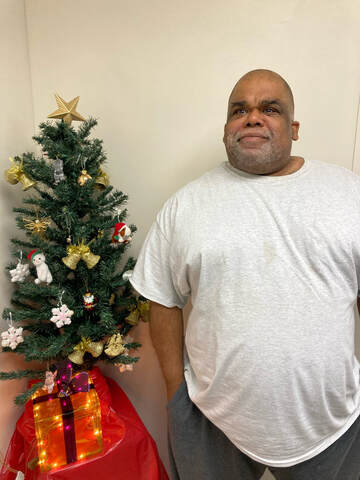
Hoot was living with his sister when she decided to sell her house.
The stress of the not having anywhere to go and being unable to afford an apartment, landed him in the hospital with heart problems, out of control diabetes and high blood pressure. He was concerned because his father had died at a young age of heart problems. After a week in the hospital, Hoot ended up on the doorstep of HOPE.
After staying at the Adult Shelter for a while, he had several trips to the hospital, his diabetes and blood pressure were still out of control. Staff members encouraged him to transfer to HOPE's Recuperative Center (Recup).
At first, Hoot was reluctant to go to a different shelter. One staff member even said to him, "One more trip to the hospital and you clearly need to go to Recup."
After that "one more trip," Hoot transferred to Recup. His health is now under control. He proudly states, "I haven't been to the hospital since I've been here!" He credits Recup and the nurses who work at HOPE with saving his life. Hoot realized that you don't know how strong you are until you have to be. He has met other guests and staff that he will keep in touch with for the rest of his life. Hoot says that he never met anyone that actually care that much about him. In fact, he wants to come back as a Peer Advocate.
The stress of the not having anywhere to go and being unable to afford an apartment, landed him in the hospital with heart problems, out of control diabetes and high blood pressure. He was concerned because his father had died at a young age of heart problems. After a week in the hospital, Hoot ended up on the doorstep of HOPE.
After staying at the Adult Shelter for a while, he had several trips to the hospital, his diabetes and blood pressure were still out of control. Staff members encouraged him to transfer to HOPE's Recuperative Center (Recup).
At first, Hoot was reluctant to go to a different shelter. One staff member even said to him, "One more trip to the hospital and you clearly need to go to Recup."
After that "one more trip," Hoot transferred to Recup. His health is now under control. He proudly states, "I haven't been to the hospital since I've been here!" He credits Recup and the nurses who work at HOPE with saving his life. Hoot realized that you don't know how strong you are until you have to be. He has met other guests and staff that he will keep in touch with for the rest of his life. Hoot says that he never met anyone that actually care that much about him. In fact, he wants to come back as a Peer Advocate.
Reprising An Important Video From The Past...
A Stressed Out Mom-To-Be
|
A recent guest, and expectant parent, had additional pressure to resolve her homelessness as quickly as possible. "If the baby comes before the apartment does, Child Protective Services will be called... That scares me. I just can't let that happen."
You can hear the tension in Siobhan’s voice when she says this. She lost a job and health benefits in Tennessee. She came to Michigan to be near family, “I’m working hard to get it all done, very quickly. HOPE has really helped me a lot. I know I couldn't have done this on my own.” After only 17 days as guests at HOPE, Siobhan and her fiancé moved into their apartment in plenty of time to set-up the baby’s room. So, now they can relax and enjoy being expectant parents. Can you imagine the stress this mom felt? |
Wayne, the Football Scholar, Gets His Own Place
|
Wayne had a long track record of success. He earned his BA degree in business with a minor in health while attending college on a football scholarship. He experienced homelessness after a long career managing traffic control workers.
After college, Wayne even had a tryout with the Kansas City Chiefs. Unfortunately, that ended in disappointment; but he didn't let that send him down a wrong path. He was committed to having a good life. He married his high school sweetheart and began working hard to provide for his family. Through a series of jobs, Wayne continued to climb into some interesting occupations. He served as a “chicken hanger” (just as bad as it sounds), a bread salesman, and eventually the manager of a road crew of traffic control workers. Although he and his family moved around the country a bit, they felt like their lives had been good. All of that changed in a quick moment. |
While driving alone down the highway, Wayne read a message that had been sent to him. The quick glance resulted in a collision with an overpass.
The damage to his spine and nerves left him unable to work. This began a long downward spiral.
Although Wayne moved back to Michigan to be with his extended family, dealing with pain and debilitating injuries left him in a deep depression. Soon, every relationship in his life was being strained by his depression and his emerging substance abuse.
The death of his father felt like the worst that could happen. But, before his father’s funeral, Wayne’s brother, also died. The grief was unbearable.
Wayne plunged deeper into the abuse of a variety of substances to numb the physical and emotional pain. None of it helped him relate to those who wished to be close to him. With every relationship now broken, he found himself completely isolated. Eventually, he lost everything.
Experiencing homelessness was devastating. He had lost hope. He kept trying to get sober, but at the end of each rehabilitation program, he found himself self-medicating the deep pain that wouldn’t go away. He kept trying, but always relapsed, quickly.
Numbing the depression had helped to hide other pains. While in a detox program, doctors discovered that Wayne had stage 4 cancer.
Confronted with his own mortality, Wayne began to cling to life.
The hospital referred Wayne to HOPE Recuperative Care Center.
HOPE was a life-saving resource for Wayne. Here, he was able to deal with his medical issues and receive extensive case management. He mended many of his relationships.
Wayne states that “HOPE challenges you to be your own man and acknowledge that what happens to you is up to you. HOPE has given me the opportunity to get it together.”
So, Wayne is reconnecting with family while taking care of his on-going health issues.
Recently, Wayne moved into his own apartment. “I couldn’t have done it without HOPE.”
NOTE WORTHY: Wayne received one of the Cleaning Kits recently donated by Eagle Scout Dominic Jolley of Troup 139. Wayne truly appreciated having all the things he needed to clean his new apartment.
The damage to his spine and nerves left him unable to work. This began a long downward spiral.
Although Wayne moved back to Michigan to be with his extended family, dealing with pain and debilitating injuries left him in a deep depression. Soon, every relationship in his life was being strained by his depression and his emerging substance abuse.
The death of his father felt like the worst that could happen. But, before his father’s funeral, Wayne’s brother, also died. The grief was unbearable.
Wayne plunged deeper into the abuse of a variety of substances to numb the physical and emotional pain. None of it helped him relate to those who wished to be close to him. With every relationship now broken, he found himself completely isolated. Eventually, he lost everything.
Experiencing homelessness was devastating. He had lost hope. He kept trying to get sober, but at the end of each rehabilitation program, he found himself self-medicating the deep pain that wouldn’t go away. He kept trying, but always relapsed, quickly.
Numbing the depression had helped to hide other pains. While in a detox program, doctors discovered that Wayne had stage 4 cancer.
Confronted with his own mortality, Wayne began to cling to life.
The hospital referred Wayne to HOPE Recuperative Care Center.
HOPE was a life-saving resource for Wayne. Here, he was able to deal with his medical issues and receive extensive case management. He mended many of his relationships.
Wayne states that “HOPE challenges you to be your own man and acknowledge that what happens to you is up to you. HOPE has given me the opportunity to get it together.”
So, Wayne is reconnecting with family while taking care of his on-going health issues.
Recently, Wayne moved into his own apartment. “I couldn’t have done it without HOPE.”
NOTE WORTHY: Wayne received one of the Cleaning Kits recently donated by Eagle Scout Dominic Jolley of Troup 139. Wayne truly appreciated having all the things he needed to clean his new apartment.
Doug's Story
This is a story about Doug; Doug’s story does not have a typical ending. It is always our goal at HOPE to help guests secure housing. In the case of Doug, the goal was different. Our goal with Doug was to work toward a peaceful transition to the next life.
Doug came to HOPE’s Recuperate Care Center in the fall of 2015 after his hospitalization for a lung problem. As it turned out, the lung problem was cancer. One of the complicating factors for attending Doug’s medical needs was the stage of his cancer was unknown.
While his medical team was arranging for a variety of diagnostic tests it was easy to observe that Doug was rapidly losing weight.
Throughout the course of treatments and evaluations, HOPE nursing staff was in regular contact with the doctors and staff of the cancer center. There was regular collaboration with the Oakland County public health nurse who was following Doug’s treatment and care. To help with Doug’s weight loss, the nurses provided nutritional supplement drinks.
In mid fall, Doug’s daughters reached out to us and the Recuperative Center Manager who encouraged them to visit, even though they lived in Tennessee. Everyone was encouraged when the daughter's visited. It was clear that the visit lifted Doug’s spirits.
As Thanksgiving approached, he was getting worse and everyone felt a return visit from his girls would be good medicine for him. He was aware of his deteriorating health, as a result he refused to have staff call them. Doug did not want his daughters to observe his decline.
In December testing confirmed what the nursing staff suspected, Doug had an advanced stage four cancer that had spread to other sites. Doug's weight loss continued despite efforts to boost him up.
At Christmas he once again refused contacting his daughters, who wanted to visit. Doug had a quiet courage about him. It is difficult for most to face the end of their mortal selves. Doug seemed to be at peace with his situation. During the holidays Doug chose a Christmas ornament that said, “Believe.” In retrospect, he seemed to be peacefully preparing himself for the great adventure beyond.
HOPE received a donation of books, which included titles by James Patterson and a John Grisham. Doug quickly secured the titles he wanted most and began to read. Most of his spare time was spent reading.
After the first of the year Doug’s condition became progressively worse. As Doug’s condition developed we realized that Doug did not have an Advanced Directive. HOPE Staff was able to secure blank copies from the cancer center where Doug was being treated. One of our nurses; Chris, who has over 15 years experience in hospice care, sat down with Doug. Chris was able to explain and complete the advance directive with him. Following that signing the advanced directive was taken to his sister a few miles away. Doug’s condition was explained to his sister as well as the need for the advance directive, which she signed.
Around the same time there was another conversation about allowing Doug’s daughters to visit him. After this conversation Doug agreed to have his daughters visit. By the time his daughters arrived from Tennessee, Doug needed to go to the hospital. HOPE Staff spent time explaining to them his condition and how seriously ill he was. Doug’s daughters were able to take him to the hospital. While at the hospital he was put in hospice care. A few short days later Doug passed peacefully with his family by his side.
Everything that could have been done for Doug was done. During Doug’s time with us we were able to get him approved for housing; which could not be realized. He received excellent, compassionate care leaving no stone unturned to help. Doug’s case required collaboration on all parts and between organizations. Each person who interacted with Doug’s case can say they did their best to be of service.
Lastly, it must be said Doug made friends so very easily. He had a regular group of guys around him all the time. Professionals (doctors, nurses, social workers, etc.) are trained to keep a professional distance from the people they work with. Working with Doug felt more like helping a friend going through a rough patch. His smile and caring attitude towards others transcended professional boundaries. It made it nearly impossible not to like him! As a result, his passing touched everyone that worked with him. We all received more than we gave and we have Doug to thank for that!
Doug came to HOPE’s Recuperate Care Center in the fall of 2015 after his hospitalization for a lung problem. As it turned out, the lung problem was cancer. One of the complicating factors for attending Doug’s medical needs was the stage of his cancer was unknown.
While his medical team was arranging for a variety of diagnostic tests it was easy to observe that Doug was rapidly losing weight.
Throughout the course of treatments and evaluations, HOPE nursing staff was in regular contact with the doctors and staff of the cancer center. There was regular collaboration with the Oakland County public health nurse who was following Doug’s treatment and care. To help with Doug’s weight loss, the nurses provided nutritional supplement drinks.
In mid fall, Doug’s daughters reached out to us and the Recuperative Center Manager who encouraged them to visit, even though they lived in Tennessee. Everyone was encouraged when the daughter's visited. It was clear that the visit lifted Doug’s spirits.
As Thanksgiving approached, he was getting worse and everyone felt a return visit from his girls would be good medicine for him. He was aware of his deteriorating health, as a result he refused to have staff call them. Doug did not want his daughters to observe his decline.
In December testing confirmed what the nursing staff suspected, Doug had an advanced stage four cancer that had spread to other sites. Doug's weight loss continued despite efforts to boost him up.
At Christmas he once again refused contacting his daughters, who wanted to visit. Doug had a quiet courage about him. It is difficult for most to face the end of their mortal selves. Doug seemed to be at peace with his situation. During the holidays Doug chose a Christmas ornament that said, “Believe.” In retrospect, he seemed to be peacefully preparing himself for the great adventure beyond.
HOPE received a donation of books, which included titles by James Patterson and a John Grisham. Doug quickly secured the titles he wanted most and began to read. Most of his spare time was spent reading.
After the first of the year Doug’s condition became progressively worse. As Doug’s condition developed we realized that Doug did not have an Advanced Directive. HOPE Staff was able to secure blank copies from the cancer center where Doug was being treated. One of our nurses; Chris, who has over 15 years experience in hospice care, sat down with Doug. Chris was able to explain and complete the advance directive with him. Following that signing the advanced directive was taken to his sister a few miles away. Doug’s condition was explained to his sister as well as the need for the advance directive, which she signed.
Around the same time there was another conversation about allowing Doug’s daughters to visit him. After this conversation Doug agreed to have his daughters visit. By the time his daughters arrived from Tennessee, Doug needed to go to the hospital. HOPE Staff spent time explaining to them his condition and how seriously ill he was. Doug’s daughters were able to take him to the hospital. While at the hospital he was put in hospice care. A few short days later Doug passed peacefully with his family by his side.
Everything that could have been done for Doug was done. During Doug’s time with us we were able to get him approved for housing; which could not be realized. He received excellent, compassionate care leaving no stone unturned to help. Doug’s case required collaboration on all parts and between organizations. Each person who interacted with Doug’s case can say they did their best to be of service.
Lastly, it must be said Doug made friends so very easily. He had a regular group of guys around him all the time. Professionals (doctors, nurses, social workers, etc.) are trained to keep a professional distance from the people they work with. Working with Doug felt more like helping a friend going through a rough patch. His smile and caring attitude towards others transcended professional boundaries. It made it nearly impossible not to like him! As a result, his passing touched everyone that worked with him. We all received more than we gave and we have Doug to thank for that!
Hope Can Help Federal Employees Affected by the Shutdown
Former Guest Eric On The HOPE Recuperative Care Center
"Finding HOPE: Stories Of The Homeless in Pontiac"
Shelters trying to keep the homeless healthy, find space to isolate the sick By Natalie Broda [email protected]; @NatalieBroda on Twitter
March 24, 2020
https://www.theoaklandpress.com/news/coronavirus/shelters-trying-to-keep-the-homeless-healthy-find-space-to/article_6f781088-6a15-11ea-b837-bfa296109ad6.html
March 24, 2020
https://www.theoaklandpress.com/news/coronavirus/shelters-trying-to-keep-the-homeless-healthy-find-space-to/article_6f781088-6a15-11ea-b837-bfa296109ad6.html
Volunteers count the homeless amid polar vortex,
|

By Natalie Broda - [email protected]
|
|
On Wednesday night, in the middle of the coldest part of this week’s polar vortex, 115 volunteers ventured out into the woods, alleyways and shelters of Oakland County to count the homeless.
The federally mandated Point in Time Count of homeless, overseen on a national level by the U.S. Department of Housing and Urban Development, takes place the last 10-days in January every year. It’s generally one of the coldest times of the season, giving agencies like the Oakland County’s Alliance for Housing a better idea on who is truly without shelter. Due to the extreme cold this year however, agencies were given the choice to postpone the annual count until February. Macomb and Wayne County agencies did just that, but in Oakland County, the Alliance for Housing decided the show must go on |
|
“We wanted to go through with it mainly because of the life threatening conditions,” Ashley Burton, grants and community manager said. “We worked out a way to transport them to the shelter, because it is an emergency situation. We’d rather go out and potentially save a life than not go out at all.”
Volunteers were enthusiastic, and bundled up, ready to spend in some cases more than five hours canvasing parts of the county, said Debra Hendren, development site coordinator. Only a few people dropped out from the count due to health concerns. |
|
“We had two women fly all the way back from Florida that morning to come and do the count,” Hendren said. “It’s a lot harder to walk away from the situation when you have an interaction (with someone who’s homeless), hearing their personal stories breaks down those stereotypes and stigma. All of us could be there given a certain set of circumstances.”
Around seven people were found out in the cold. Four of them chose to deny transportation the shelter, a common barrier agencies deal with year after year due to the fear, and shame, associated with homelessness. Some worry they may be taken to jail, others simply don’t want anyone to know about their situation. |
One man was found in a fast food restaurant in Walled Lake just a few hours before closing time. At first he declined the transportation, but Shannon Smith, director of housing programs at Lighthouse of Oakland County, said he changed his mind when volunteers came back inside to offer him resources.
“We try to talk to them, let them know we’re here to help and that we want them to be warm and safe. Both of the people we ended up taking to shelters were extremely grateful,” Smith said. “One man told me he had watched someone close to him pass from the elements. That’s trauma on top of the trauma they may not have worked through for their own situation.”
Smith and James McQueen, pantry manager at Lighthouse, spent six hours on Wednesday night responding to calls from volunteers to pick up individuals in the cold. Lighthouse bought two new vans this year and Smith said when they heard about the extreme cold happening the same day as the count, she knew they could be of help in bringing people into a warming center for the night. The organization plans to bring two vans to the count next year.
“We try to talk to them, let them know we’re here to help and that we want them to be warm and safe. Both of the people we ended up taking to shelters were extremely grateful,” Smith said. “One man told me he had watched someone close to him pass from the elements. That’s trauma on top of the trauma they may not have worked through for their own situation.”
Smith and James McQueen, pantry manager at Lighthouse, spent six hours on Wednesday night responding to calls from volunteers to pick up individuals in the cold. Lighthouse bought two new vans this year and Smith said when they heard about the extreme cold happening the same day as the count, she knew they could be of help in bringing people into a warming center for the night. The organization plans to bring two vans to the count next year.
|
In total, there are only 250 permanent shelter beds in Oakland County for its 4,000 homeless.
“One thing I found that really made an impact this year was finding these individuals in rural areas. People don’t see that homelessness exists there, because it’s not on the street corner,” Smith said. One of the sites individuals were driven to was the Hope Warming Center in Pontiac. They’ve got 62 beds there, which have been at capacity the past few days. Some slept in chairs once the beds were full — Hope Warming doesn’t turn anyone away, Elizabeth Kelly, co-founder and executive director of the shelter said. |



